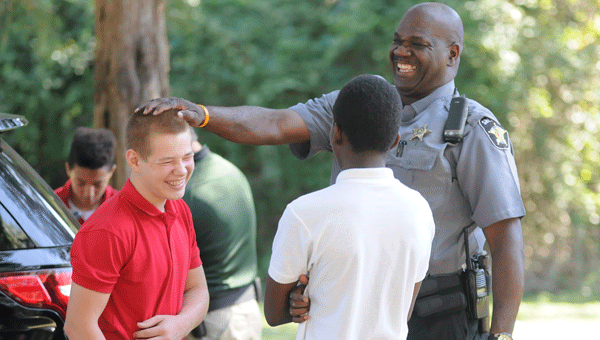Law enforcement educate youth on protocol
Published 5:36 pm Friday, September 23, 2016

Butler County Sheriff’s Office deputy Tony Bufford shares a laugh with a handful of Butler County students following a mock exercise Wednesday morning.
Thirty students from all four Butler County schools found themselves in the back of a squad car at one point or another Wednesday afternoon.
However, the experience was not only a pleasant one, but it also proved equally informative.
The Greenville Police Department, the Butler County Sheriff’s Office and the FBI’s Mobile division teamed up to run several 8th, 9th and 10th graders from Fort Dale Academy, Georgiana, Greenville and McKenzie through a series of real-life scenarios involving law enforcement.
The aim, according to assistant special agent in charge Bret Kirby, was to provide hands-on experience for students in situations that are difficult, if not impossible, to prepare for otherwise.
“The program was developed to educate that age range of kids who are, according to the research, most susceptible to having a negative experience with law enforcement to teach them that the guys that wear a uniform and a badge every day are human just like them,” Kirby said. “And that they’re not looking for a negative encounter. And also to let them know what their rights are if they’ve had an encounter like that.”
The students were taken through a number of stations, including a simulation of a routine traffic stop, a domestic disturbance investigation in a fabricated party setting—complete with loud sounds provided by students and officers alike—and a third station concerning proper compliance with officers asking for identification.
In the variety of scenarios, students learned a number of tips for dealing with law enforcement, such as committing one’s driver’s license number or social security number to memory, refraining from putting one’s hands in his or her pockets near officers and the distinction between being placed in handcuffs and being arrested.
Greenville Police Department chief Lonzo Ingram said that, despite the fact that the GPD already has a sound working relationship with its community, programs such as Wednesday’s go a long way toward fostering even more trust between the department and the citizens it has sworn to protect and serve.
“The problem is how are we going to reach all of the kids?” Ingram said.
“We’ve got 30 kids down here, but we need all of our kids to know this. I’ve always thought that in all schools, we need to have law-related education where they could do things like this as a part of a civics class, and do something that would be hands-on and really good to learn about police, law enforcement, the laws and how to interact with police officers. We’re in a world now where people don’t have respect for themselves, much less respect for you, the police or anyone else. So we’ve got to change that somehow, and I think that would be a good way to do it.”
Butler County sheriff Kenny Harden said that the limited selection of 30 diverse students was a purposeful decision to help spread the word.
“I didn’t want all honors students or all at-risk students—I wanted a mixture,” Harden said.
“The reason why is because you have honors students who may not socialize with at-risk students, so by getting them all together, they can go back and pass the word to their peers. With 30 students here and their teachers, I’m hoping that each one of them will take something back to their school, their families and the community and talk about their experiences.”
Cynthia Smith, assistant principal of Georgiana School, said that the experience was equally beneficial for herself as well as her students.
“Personally, for the children and for me as a civilian, it gave me great insight of the mindset of a police officer on a daily basis,” Smith said. “He or she is trained to do specific things in a certain way, so to give us knowledge and understanding of what their training requires that they do, I now know what to do to help both of us be safe. I think the overall program is just awesome, and it certainly did lend itself to greater understanding of our guys in blue.”
Both Ingram and Harden expressed an interest in developing the program into something that could reach a larger audience, and Smith added that the days following the experience are vital in achieving that goal.
“Part two of this journey is to go back and have a pow wow about what we experienced,” Smith said.
‘This is what I saw and what I was enlightened on.’ I hope that it grows bigger, and gets more students in here to experience this. As a first-hand experience, you cannot beat this.”





